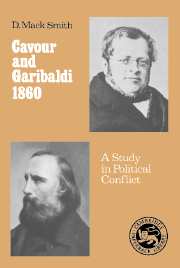Book contents
- Frontmatter
- Contents
- Preface
- Abbreviations
- Introduction
- Chapter I Political opinions in Sicily: April–June 1860
- Chapter II Cavour and the diplomats: April–June
- Chapter III La Farina and Crispi: June
- Chapter IV Arguments for and against annexation
- Chapter V Arguments over ways and means
- Chapter VI Crispi loses the first round: June
- Chapter VII Cavour loses the second round: July
- Chapter VIII Cavour adjusts his policy: July
- Chapter IX Depretis begins his prodictatorship: July
- Chapter X Cavour plans a revolt at Naples: July
- Chapter XI Cavour fails at Naples: August
- Chapter XII Political differences in Sicily: August
- Chapter XIII Cavour forces Depretis to a choice: 1–8 September
- Chapter XIV Depretis fails to persuade Garibaldi: 8–14 September
- Chapter XV Garibaldi succeeds at Naples: 1–15 September
- Chapter XVI Cavour breaks with Garibaldi: September
- Chapter XVII The radicals at bay: September
- Chapter XVIII Mordini the new prodictator: 17–25 September
- Chapter XIX Further controversy over annexation: September–October
- Chapter XX Mordini summons an assembly: 5 October
- Chapter XXI Pallavicino fights for a plebiscite: 8 October
- Chapter XXII Parliament supports Cavour: October
- Chapter XXIII Mordini changes his mind: 9–13 October
- Chapter XXIV Garibaldi makes his decision: 9–13 October
- Chapter XXV The plebiscite in Sicily: October
- Chapter XXVI The doubtful significance of the vote: October–November
- Chapter XXVII Cavour's government in the south: November–December
- Chapter XXVIII Conclusion
- Index
Chapter V - Arguments over ways and means
Published online by Cambridge University Press: 30 October 2009
- Frontmatter
- Contents
- Preface
- Abbreviations
- Introduction
- Chapter I Political opinions in Sicily: April–June 1860
- Chapter II Cavour and the diplomats: April–June
- Chapter III La Farina and Crispi: June
- Chapter IV Arguments for and against annexation
- Chapter V Arguments over ways and means
- Chapter VI Crispi loses the first round: June
- Chapter VII Cavour loses the second round: July
- Chapter VIII Cavour adjusts his policy: July
- Chapter IX Depretis begins his prodictatorship: July
- Chapter X Cavour plans a revolt at Naples: July
- Chapter XI Cavour fails at Naples: August
- Chapter XII Political differences in Sicily: August
- Chapter XIII Cavour forces Depretis to a choice: 1–8 September
- Chapter XIV Depretis fails to persuade Garibaldi: 8–14 September
- Chapter XV Garibaldi succeeds at Naples: 1–15 September
- Chapter XVI Cavour breaks with Garibaldi: September
- Chapter XVII The radicals at bay: September
- Chapter XVIII Mordini the new prodictator: 17–25 September
- Chapter XIX Further controversy over annexation: September–October
- Chapter XX Mordini summons an assembly: 5 October
- Chapter XXI Pallavicino fights for a plebiscite: 8 October
- Chapter XXII Parliament supports Cavour: October
- Chapter XXIII Mordini changes his mind: 9–13 October
- Chapter XXIV Garibaldi makes his decision: 9–13 October
- Chapter XXV The plebiscite in Sicily: October
- Chapter XXVI The doubtful significance of the vote: October–November
- Chapter XXVII Cavour's government in the south: November–December
- Chapter XXVIII Conclusion
- Index
Summary
These differences of opinion were reflected from the start in practical politics. We have already watched the commencement of La Farina's campaign. But the political scene in Palermo still remained agitated after Garibaldi's rebuff on 22 June to the champions of immediate annexation. On the 23 rd, Crispi's government was weakened by the resignation of two leading members of the Sicilian aristocracy, the Marquis di Torrearsa and Baron Pisani. Later in the same day, perhaps as a partial concession, a decree was issued to say that local authorities should draw up electoral registers and have all ready for voting by 20 July. This marks a small but definite retreat by Crispi from the policy of ‘nothing at all till Rome’ which Garibaldi had proclaimed the day before in his speech to the civic council. It was a new development, which shows that the situation was now becoming more complicated.
In trying to explain this modification of view, it first of all is clear that Crispi's political ascendancy had been shaken by the insinuations of La Farina, and he was therefore in a compromising mood. We know that he was trying to make contact with Cavour at this time, perhaps hoping to displace his rival in Sicily, and to reconcile all parties there by some striking and meritorious act of statesmanship. He had found that he could not ride the radical programme rough-shod over Palermo opinion. Sicilian susceptibilities had been touched by his innovation of conscription, and war conditions were adversely affecting many vested interests in the island.
- Type
- Chapter
- Information
- Cavour and Garibaldi 1860A Study in Political Conflict, pp. 57 - 70Publisher: Cambridge University PressPrint publication year: 1985



